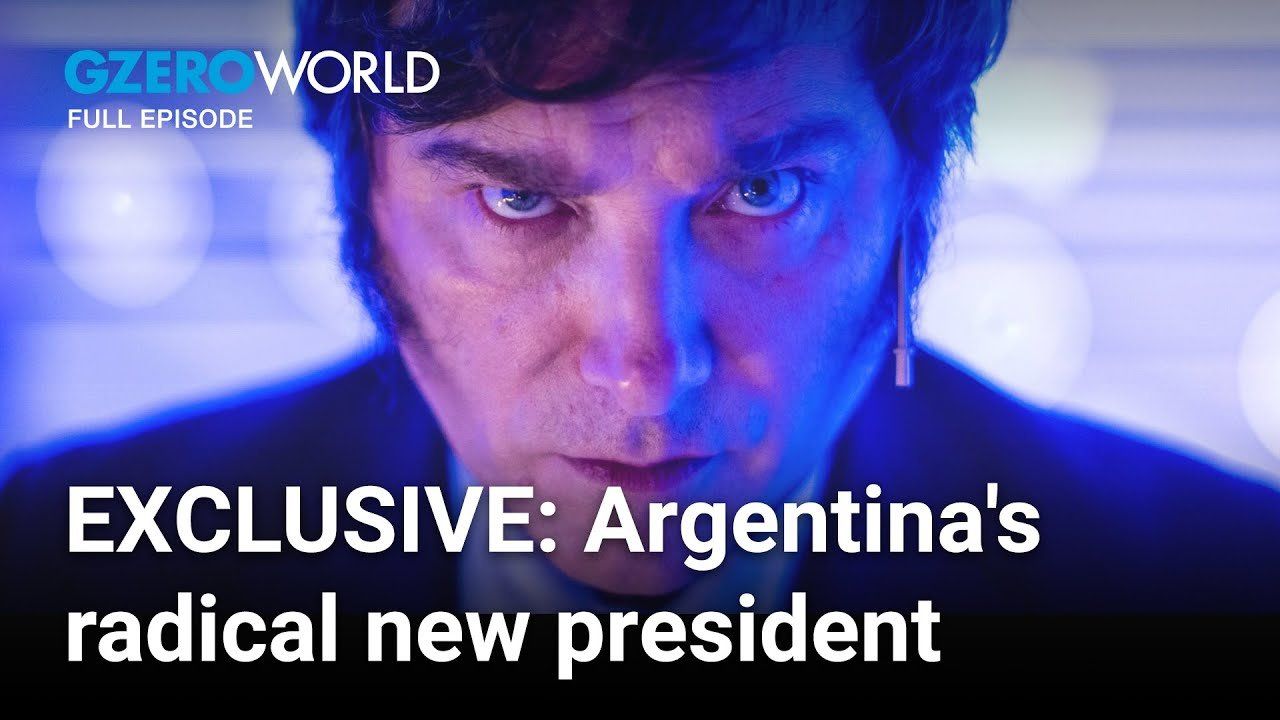GZERO World with Ian Bremmer
Argentina's radical new president, Javier Milei (Exclusive interview)

Argentina's radical new president, Javier Milei (Exclusive interview) | GZERO World with Ian Bremmer

In an exclusive interview with Ian Bremmer for the latest episode of GZERO World, Argentine President Javier Milei defends his radical approach to saving Argentina’s struggling economy, his commitment to aligning with liberal democracies, and his pragmatic stance on international trade and alliances.
There's no getting around it: Argentina's new president, Javier Milei, is an odd duck. But beyond his penchant for cloned dogs, messy hair, and bombast, what’s truly radical about the South American leader is his plan to save Argentina’s economy. When he ran for office, the economics professor-turned-TV pundit-turned-presidential-candidate vowed to eliminate Argentina’s central bank and threatened to replace the Argentine peso with the American dollar. But once he came to office, a more pragmatic approach to economic reform emerged. And in just six months, his administration has managed to slow Argentina's 300% annual inflation and turn a budget deficit into a surplus. "We have actually completed the largest reform in the history of Argentina," he proudly tells Ian Bremmer in an exclusive new interview for GZERO World, highlighting the scale of his efforts to overturn what he calls "100 years of decadence."
(Note: Turn on closed captions for translation from Spanish to English or your preferred language.)
Milei's libertarian economic policies, although effective in some respects, have also led to significant hardships. "Life is going to be harder for the average Argentinian citizen," he acknowledges. Despite these challenges, Milei's popularity remains high, attributed to his honesty and transparency with the public.
In a wide-ranging interview with Bremmer, Milei also explains that his approach to foreign policy is marked by a mix of ideological commitment and pragmatic flexibility. He champions free trade and economic liberalization while acknowledging the complexities of dealing with autocratic regimes. "The world should be separated between liberal democracies and autocracies," Milei asserts. Yet, he does not shy away from engaging with China, recognizing the economic benefits such relationships can bring. "If I were to limit that trade, which is free, would Argentines be better off or worse off?" he asks Bremmer, advocating for a balanced approach that prioritizes Argentina's well-being.
Milei's staunch support for Israel is another defining aspect of his foreign policy. When Ian asks him about the Gaza war, his answer is simple and unwavering. "I will continue to support Israel right to the end."
New digital episodes of GZERO World are released every Monday on YouTube. Don''t miss an episode: subscribe to GZERO's YouTube channel and turn on notifications (🔔).
In this Quick Take, Ian Bremmer reacts to President Trump’s State of the Union address, calling it “a rehashing of the greatest hits” with little new policy direction.
Small business hiring surged 7% above the 2024 average in December, led by a surprise rally in retail. But with uncertainty still historically high and mounting concerns over tariffs, can this momentum survive 2026? Explore the data behind the resilience of the US small business sector. Get the latest economic insights from Bank of America Institute.